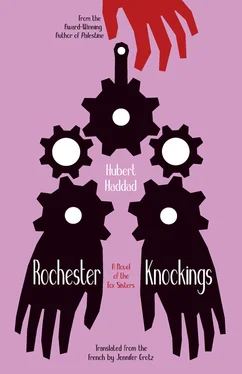These comments appeared a few days later, rewritten into good English, on the front page of the New-York Tribune, and Margaret, who hadn’t taken this chance encounter seriously, discovered them in a different bar on the Lower East Side, paging through the house copy fastened to a newspaper stick. Immediately paralyzed, she finally shrugged and read the date above the headlines with a renewed superstition: hadn’t she been converted on September 24 th? Still clinging to her Catholic faith, Margaret saw in the number of the year a great symbol: 1888. Nothing less than the divine Unity flanked by the three infinities of the Trinity!
She wasn’t unhappy about the racket this off-the-cuff interview was going to provoke in the spiritist and spiritualist circles: the world would remember her. She could easily imagine Leah’s fury. But the long letter she received by general delivery a few days later quite cleverly showed nothing of it. Her sister sermonized her for five pages, in the name of the cause, presenting her with her complaints, the unspeakable discredit she was guilty of, the shame that her conduct was inflicting on the family, and in conclusion guaranteed her a lawsuit at the next prank. The stationery was beautifully printed with the name of Mrs. Leah Fox-Underhill, and the handwriting in blue ink was neat and proper. Margaret crunched it into balls that she threw into the fire.
From a furnished room on the Lower East Side or in Greenwich Village, her only luggage a trunk where she kept her stage outfit and a few accessories, Margaret fell back into a sullen anonymity. Her whim had hardly dented the reputation of Leah, who grandly used her right to respond by inviting the best writers of the spiritualist cult to defend her honor. Cleverly inverted, stigma is only a stepping stone.
Left to herself more than ever, Margaret dreamt of returning to Monroe County, where she remembered a few people she’d known who were probably still alive, some of whom might be willing to help her. A remote town like Rochester is willingly flattered to have what London or New York are tired of.
Margaret considered more and more seriously getting a one-way ticket at Grand Central Station when, again by general delivery, two letters delivered on the same day changed her mind. One of them overwhelmed her with sadness and anger, the other handed her the means necessary for that divine justice named revenge. The first came from Kate, who in her despair didn’t leave an address. Leah had now gotten her way. On the basis of her accusations, Katie had been arrested for vagrancy on a public street while looking for a place to live, she and her sons loaded down with luggage. Custody of her children was withdrawn in the wake, under the allegation of abuse. Despite all of her appeals and petitions to the court, before the judges, to the governor, the court decision was upheld. Placed in the Saint Vincent de Paul orphanage, the twins claimed their mother as much as she claimed them. After the judgment confided the custody of Arcady and John Elias to her British in-laws, Uncle Herbert hardly tarried in having them delivered on a liner of the General Transatlantic Company. That was all the contents of her letter. Kate added, a little wave falling over the shipwreck of her signature: “Maggie, defend me! Help me! I cannot survive without my angels.” The other letter she opened with trembling hands and read through her tears:
Dear Margaret Fox-Kane,
I had the opportunity to learn with surprise and satisfaction of your disillusioned declarations a while back in the New-York Tribune. You are perfectly right to set the record straight. Leah Fox-Underhill scandalously injured you, you and your little sister. I thought that you might push the envelope further in a profitable way. Essentially, why not make a public demonstration of it to New York itself. The idea occurred to me that we could earn a lot of money by renting the biggest hall in town, that of the Academy of Music. With a good slogan like “The Return of the Fox Sisters” or “Margaret Fox Denounces the Sham,” it’s two thousand dollars guaranteed. I would charge for my services of course, with the usual terms, for the organization, promotion, and success of the event.
Remember, dear Margaret, what a devoted agent I was for you for a long time, etc.
Frank Strechen
The card of a Brooklyn hotel with the telephone number underlined in the same ink accompanied the letter. She got back in contact with the manager that same day and, determined to ruin the reputation of Leah Underhill, agreed with him without going into all the details on the protocol of the event. Strechen wanted a show, something vengeful and bloody.
In the weeks leading up to it, Margaret had long had a single thought: to find Katie. Margaret returned in vain to the sumptuous mansions of old contacts, financiers, and amateur traders in the unknown, but only their vestibules remained accessible to her. In desperation, and banned entrance to Leah’s building on Cotton Street, she had humbled herself to beg Leah in the premises of the Spiritualist Circle of Union Square. They unceremoniously kicked her out after her sister had demanded the solemn confession of her crimes toward the cause. “I’ll die first!” Margaret had responded. The followers present had carried her out like a sack under Leah’s glacial eye. For entire hours that day, brooding over her hatred in the chalky June light, Margaret had wandered in search of Kate between the ponds and hills of Central Park. At the end of one path, under the inclement glare of the sun, a preacher of the end of the world was perched on a bench, holding forth to himself alone:
“Behold, I stand at the door and knock; if anyone hears my voice and opens the door, I will come in like a friend to his friend’s house.”
That was just it, she thought, “if anyone hears my voice,” but no one would answer her anymore in Heaven just like on Earth.
At the approach of the month of August, impressive storms sliced with torrential rains didn’t diminish the tropical heat wave by even a single degree. The New York newspapers soon announced with various caustic or bemused commentaries, and along with an unattractive photograph, the exceptional performance of Margaret Fox in the grand auditorium of the Academy of Music. Never letting go of the daggers of her anger, Margaret could feel a wave of panic rising in her. Being recognized once or twice in public terrified her like the pronouncement of a curse. Among the bustle of the streets, in one neighborhood or another, she’d stop to catch her breath at the first shop sign for absinthe or any kind of alcohol to revive the part of her that was dying, and was able to pay thanks to the advance of two hundred dollars burning a hole in her pocket. But it was necessary for her to feed this covert fire day and night without losing control, until the moment of surrendering herself to the invisible, several brutal hours where, poked by myriad waxy demons, the hell promised to the intemperate would welcome her in for an atrocious prelude from which she would escape twenty times over in her sleep, dreaming that she was running after a sleepwalker more elusive than a flickering flame. Finally, eyes wide open, crying voicelessly into a stony silence, she thought she was calling for help. But there was nobody in the world to answer her.
Then, wide-awake, she recognized a little voice:
O the good times are all dead and gone
Singin’ hi-diddle-i-diddle
Still I love you dear, my whole life long
Singin’ hi-diddle-i-diddle
IX.Poltergeist at the Academy of Music
A crowd is just a kind of maelstrom of opinion, a whirlwind, an open mouth of hungry souls. Wherever this Leviathan of circumstances arises — cyclonic dragon, serpent of storms — all trace of altruism or of simple humanity disappears and the most one can hope for is a speedy return from primitive chaos, the animal brain, before all cataclysm.
Читать дальше












